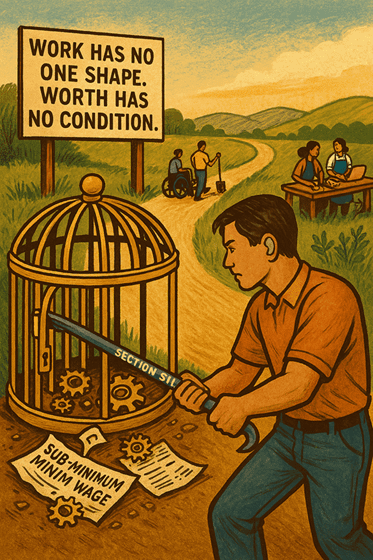
Editor’s Note: Last Month, We published a post explaining some basics about the subminimum wage provisions of the Fair Labor Standards Act, how and why it came into being and remains in force, subjecting hundreds of thousands, if not millions of disabled Americans to extreme poverty and segregated employment, and how that practice needs to end (Read that post here). Here, LIFTT IL Program Manager Pamela Ramirez writes about conducting career counseling with subminimum wage workers through Section 511 of the Workforce Innovation and Opportunities Act. A required yearly Section 511 counseling is often the only time such workers learn about alternatives to their situation. While not every subminimum wage worker will choose to pursue the independent living and vocational rehabilitation services offered, a seed of independence is planted through these visits.
Who Belongs in the Workforce?
Let’s talk about something that often gets lost in the polite language of policy: work, value, and who gets to belong in the workforce.
Section 511 of the Workforce Innovation and Opportunity Act (WIOA) was never meant to be a silver bullet, but it is a disruption—a much-needed one. It says that before someone with a disability can be placed in a job that pays below minimum wage (yes, that’s still legal under Section 14(c) of the Fair Labor Standards Act), they must be offered career counseling, job exploration, and access to competitive employment pathways.
Translation: The days of automatically steering people into low-wage, low-opportunity jobs because of a disability are over. Or at least, they should be.
A Visit to Special K Ranch: Counseling Meets Community
Recently, LIFTT visited Special K Ranch, a unique community along the Yellowstone River where 35 lifelong residents live, work, and thrive in a rural, agricultural setting. There’s a greenhouse, livestock, vocational programs, and space to dream bigger.
We came not to lecture but to listen and share—to offer Section 511 Career Counseling and invite folks to imagine a different kind of work future. One where a person’s value isn’t measured against an able-bodied benchmark but recognized for what it is—real, human, and worthy of fair pay.
Deconstructing the Old Script
Here’s the truth: many people with disabilities grow up in systems that whisper, “this is your lane — stay in it.” Sheltered workshops. Segregated environments. Always less than. But Section 511 throws a wrench into that narrative. It says: you have options. You can pursue competitive, integrated employment. You deserve access to information, support, and pathways to your own version of success. For many, that shift — from “I can’t” to “Why not me?” — is revolutionary.
Sub-Minimum Wages: The Price of Exclusion
Let’s name it: paying someone less solely because they’re disabled is not a workaround — it’s discrimination.
The argument has always been productivity. It is as if the only measure of someone’s worth is how many widgets they can produce per hour. But when you reduce humans to output, you lose everything they bring — tenacity, creativity, loyalty, diversity of thought.
States that have ended using sub-minimum wages haven’t collapsed—quite the opposite. When workers with disabilities are provided job coaching, inclusive supports, and opportunities, they don’t just meet expectations — they rewrite them. Inclusive hiring isn’t charity. It’s smart economics. And more importantly, it’s justice.
Beyond Section 511: The Work Ahead
Section 511 is a beginning, not an end. It’s the crack in the wall, not the teardown.
We still have Section 14(c) on the books. We still have structural ableism in defining “work” and “worthiness.” But there’s momentum. There are movements. And there are people — like those at Special K Ranch — ready to live lives that defy every tired assumption.
A New Lens on Labor
Eliminating sub-minimum wages isn’t just about paychecks. It’s about dignity, autonomy, and self-worth. It’s about dismantling the idea that only certain people are “employable” in meaningful ways. And it’s about building a workforce where every person has the right to expect fair compensation for real work.
We’re not there yet. But thanks to WIOA, Section 511, and the courage of those who believe in something better, we’re on the way.
